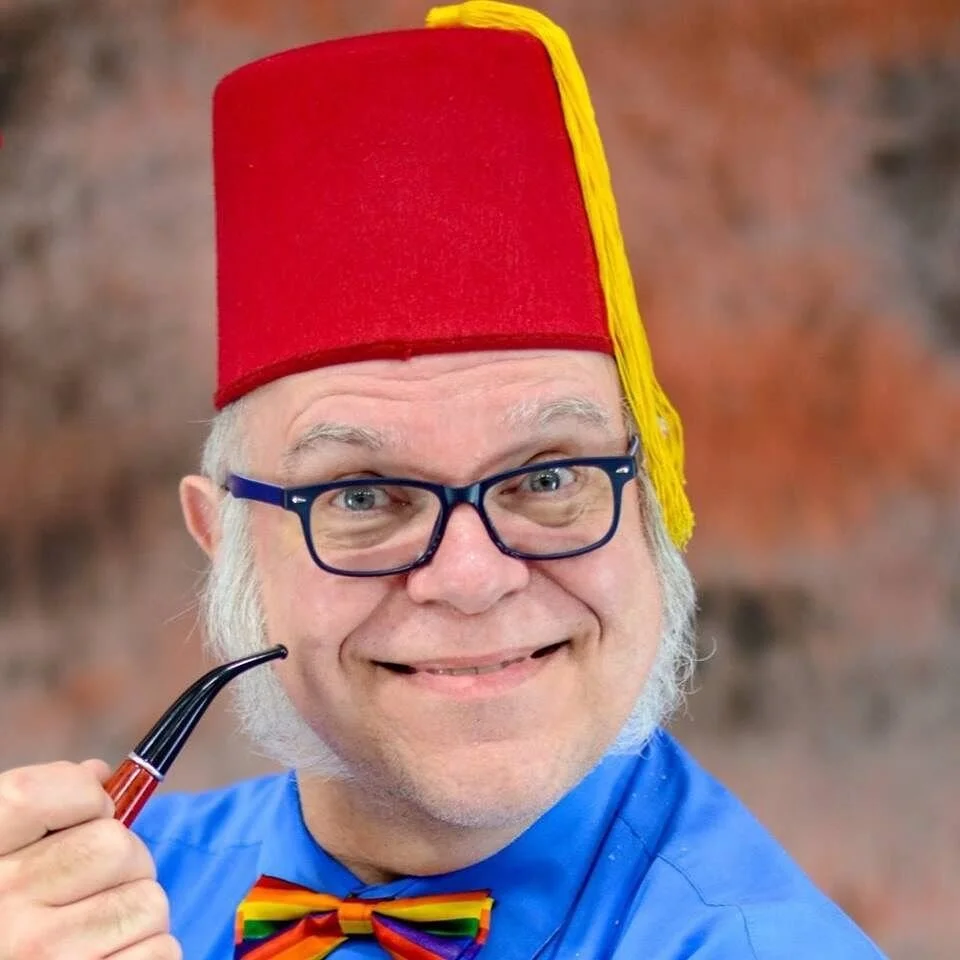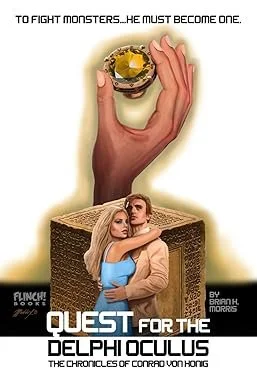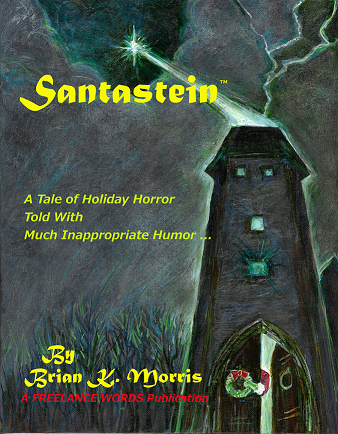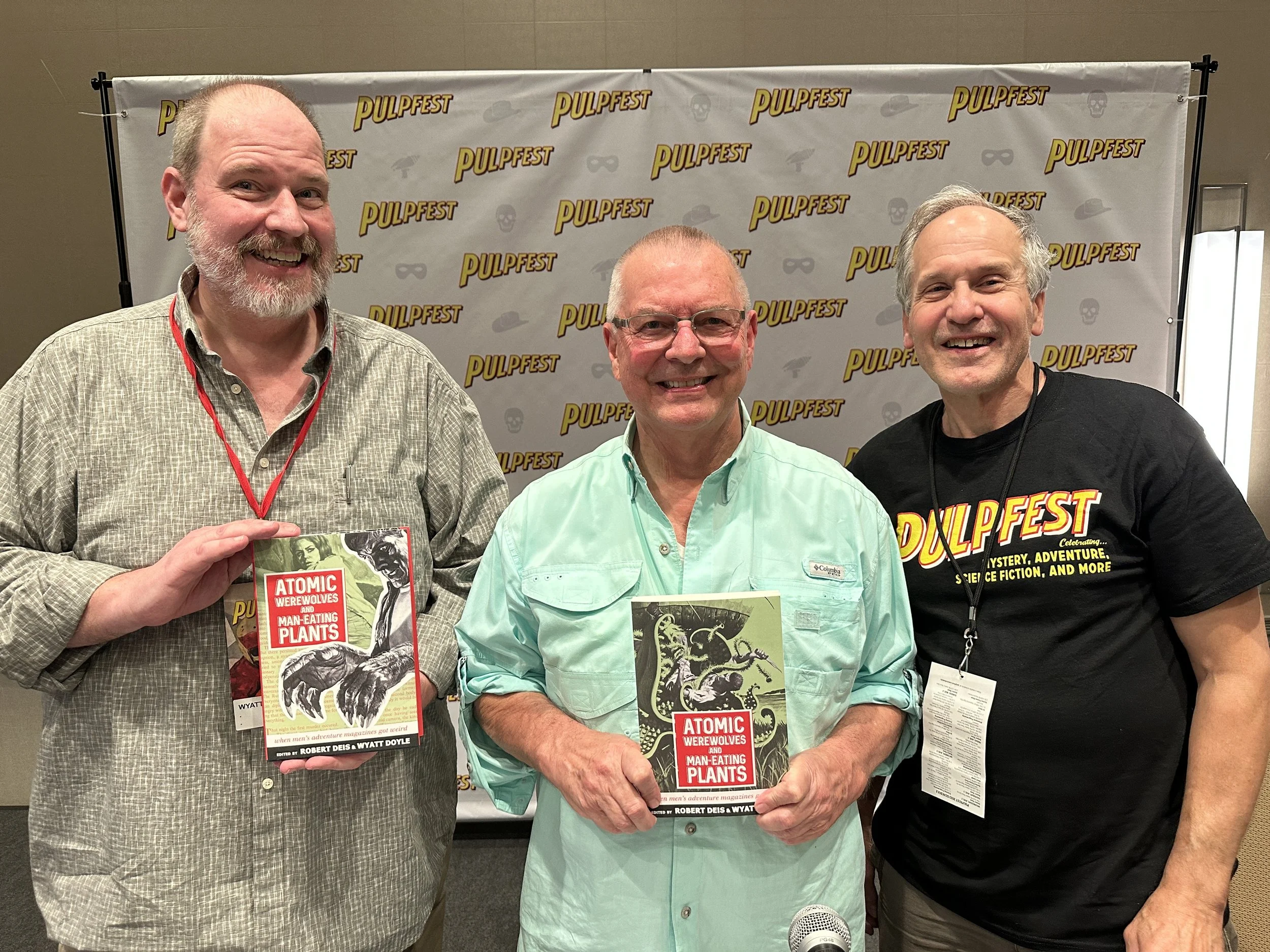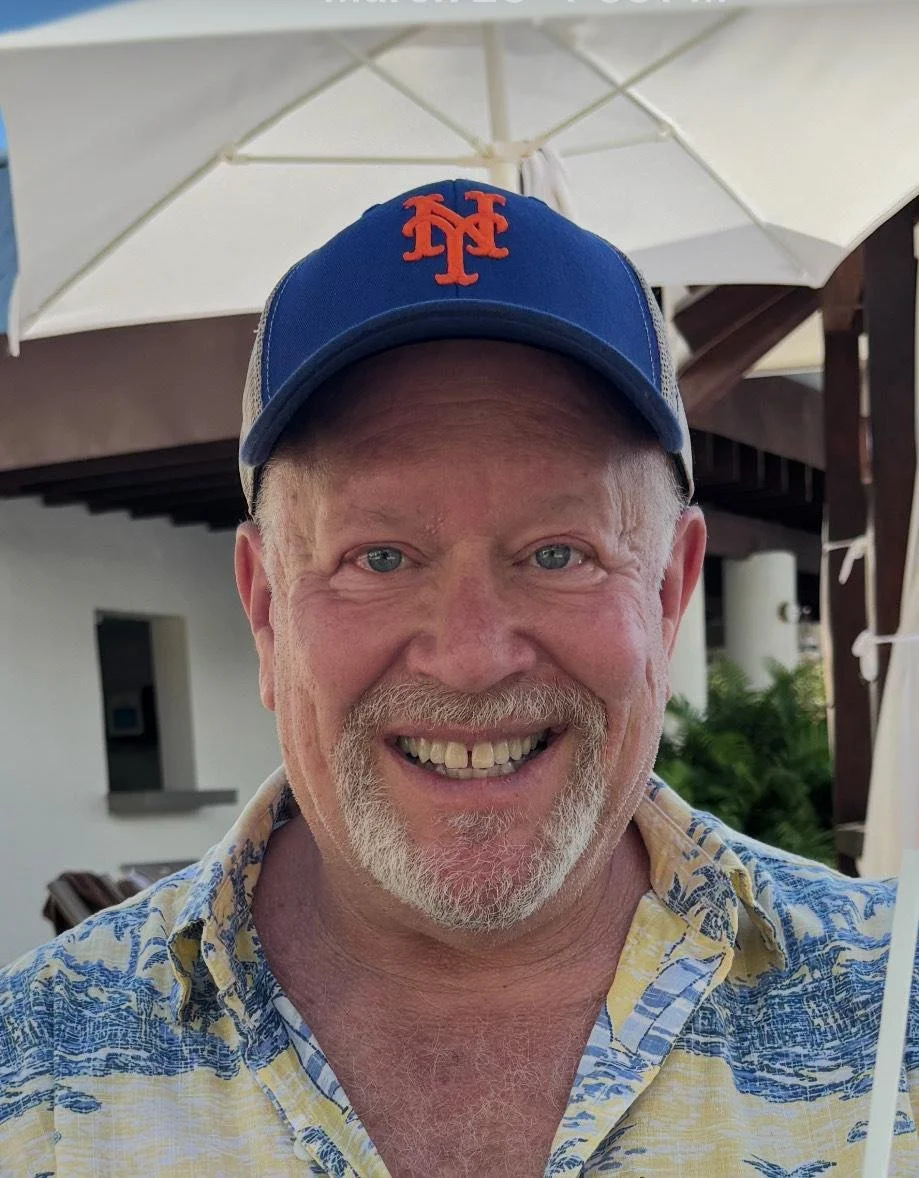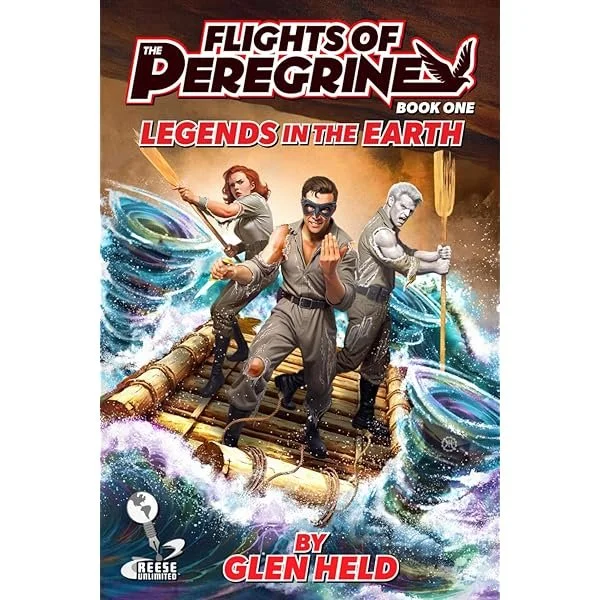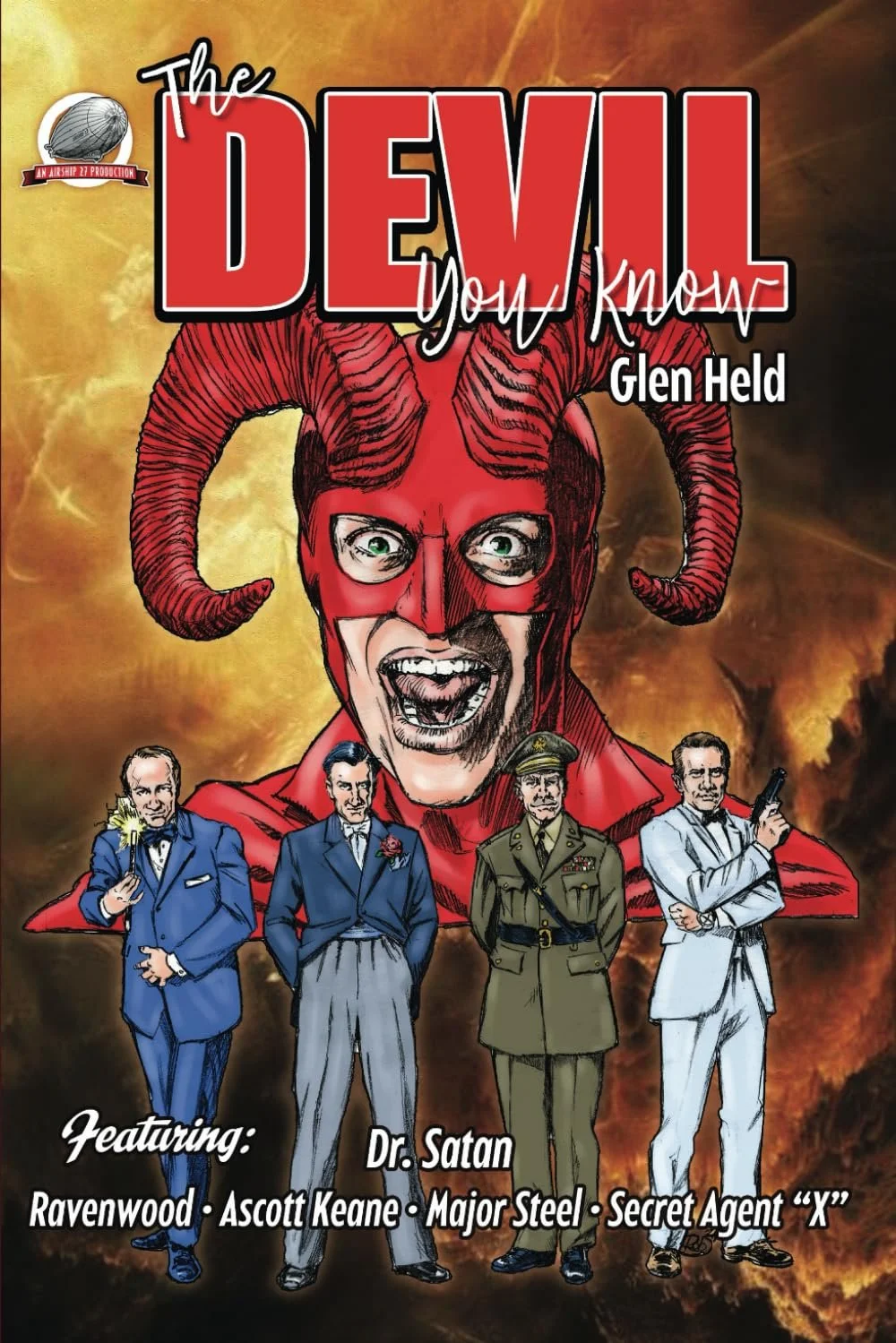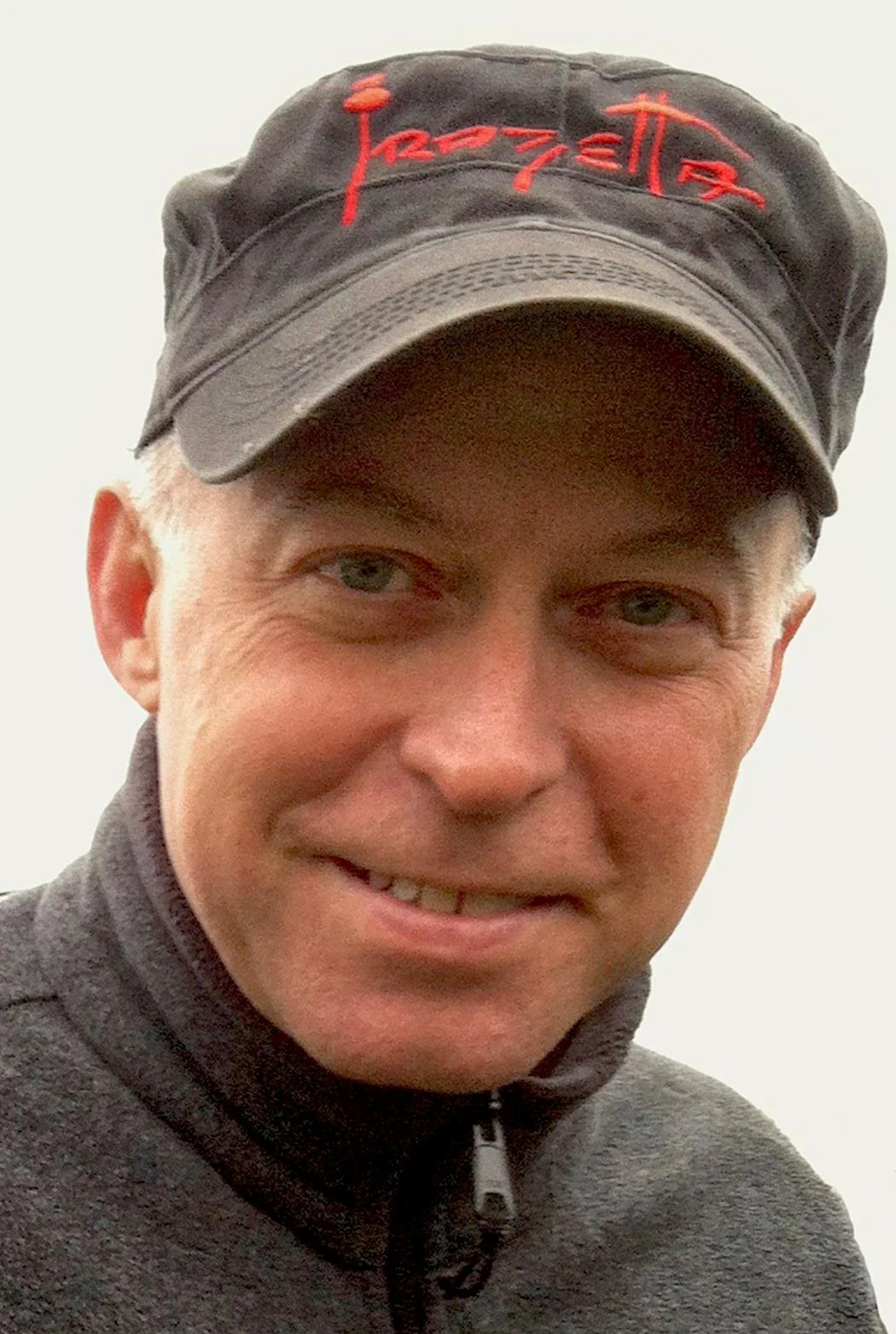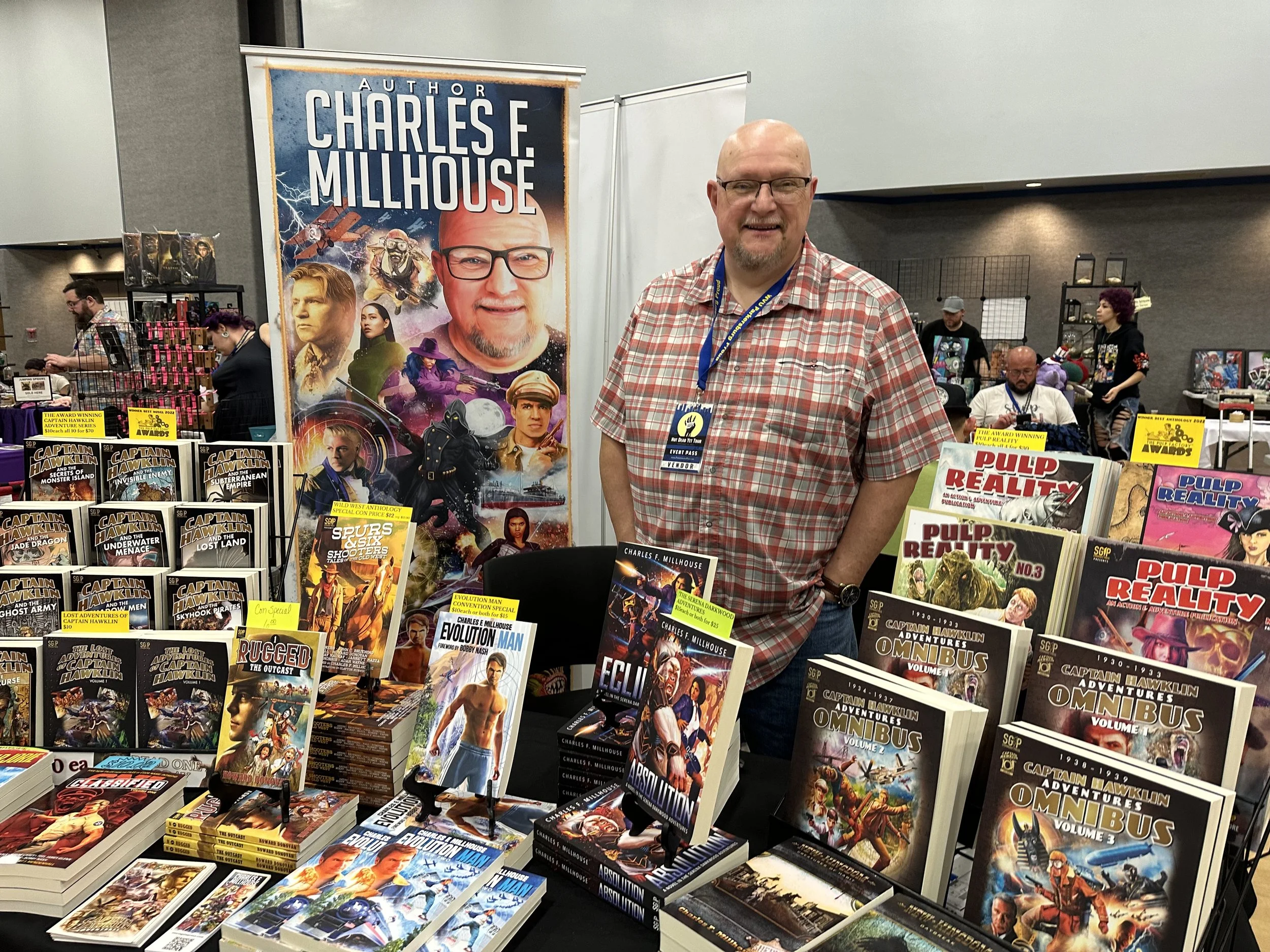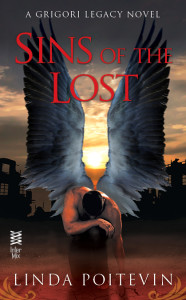Hi Mike! Thanks for taking some time out of what I’m sure is a busy schedule prepping for PulpFest 2025 to chat.
Of course, Anthony/Antny/Anton/Ant/Dinty/Thanny/T/Sandy/Andrew/The Other Guy /Stormy/; . . . I’m not exactly sure what to call you. Perhaps I’ll just call you, Lamont.
I mean, I don’t mind being mistaken for one of The Shadow’s many identities … (For those who don’t know, my email signature is a list of every nickname I’ve ever had. I guess I need to add Lamont now!)
For readers who may be unfamiliar with PulpFest, can you tell me a little about the convention’s focus and history?
The focus of PulpFest is pulp magazines — fiction periodicals named after the cheap pulp paper on which they were printed. The first pulp was published in 1896 by Frank A. Munsey. It was called The Argosy.
The first PulpFest took place in 2009 in Columbus, Ohio. The convention was founded by Jack Cullers, Barry Traylor, Ed Hulse, and me. Chris Kalb, a very talented artist and illustrator, helped us by setting up our website. He also put together several flyers and ads for the convention. So Chris was a big help getting PulpFest off the ground, but he didn’t want to be one of the so-called organizers or founders. But he helped big-time.
Before the first PulpFest, there was a long-running pulp convention known as Pulpcon. The first of these took place in 1972, and the convention pretty much continued on a nearly annual basis through 2008. Jack, Barry, and I were all members of the “crew” that organized Pulpcon during its final years. But many people felt that major changes were required for the convention to survive, and PulpFest was the result.
So between PulpFest and Pulpcon, we’ve been around for more than fifty years, celebrating “mystery, adventure, science fiction, and more” pretty much each and every summer.
Every year, PulpFest has a theme. What is the theme for PulpFest 2025, and what programming can attendees expect to enjoy related to that theme?
My wife likes to kid me about the anniversaries we celebrate at each and every PulpFest. Of course, if I forgot about our wedding anniversary, she’d be ticked off at me.
Regardless, we have this spreadsheet listing the start of important magazines such as Black Mask, Doc Savage, Weird Tales, or what have you. And then there’s another that lists the birthdays of major writers, artists, editors, publishers, and so on.
Well, I already knew that 2025 was the 150th anniversary of the birth of Edgar Rice Burroughs. But when I was looking at our spreadsheets last summer, I also noticed that Edgar Wallace, who was called “The King of the Thrillers” in Great Britain, and Rafael Sabatini, the celebrated author of historical fiction, were also born in the same year.
I pointed this out to Bill Lampkin, the convention’s advertising director, and we came up with the line, “Celebrating the Masters of Blood and Thunder.” We thought the phrase pretty much summed up the writing of all three writers.
So this year’s programming will have presentations on Wallace, Sabatini, and Burroughs, along with films related to at least two of the authors: King Kong and The Sea Hawk.
Although both Wallace and Sabatini had a good deal of fiction in America’s pulps, ERB was one of the “big guns” of the industry, creating Tarzan of the Apes, John Carter of Mars, and other series for the rough-paper magazines. So we’ll have presentations on Tarzan illustrators, Tarzan merchandising, and ERB’s “disciple,” Ray Bradbury. All of these will be part of our mini-convention, ERBFest 2025. Your membership in PulpFest also makes you a member of ERBFest.
2026 is also the anniversary of the “villain pulps.” These were character pulps that had bad guys as their so-called “star.” There was Doctor Death, The Mysterious Wu Fang, and in Weird Tales, a series of Doctor Satan adventures. These all began in 1935. Doctor Yen Sin, The Octopus, and The Scorpion came later.
In addition to ERBFest, we’ll also be hosting Farmercon XX, a convention that we’ve been hosting almost every year since 2011. And then there’s Doc Con 2026, a convention that we’re reviving thanks to a group of Doc Savage fans who have been attending PulpFest for a number of years. This year, PulpFest and Doc Con will be celebrating the Golden Anniversary of the George Pal film, Doc Savage: The Man of Bronze. It came out fifty years ago, back in 1975.
I would love to hear about your own personal connection to the pulps: your first encounter with them, favorite titles or characters, etc.
Well, my birthday is around the middle of August. So every year, I’d get presents from our relatives right before the start of school. And not having a whole lot of money, my parents naturally used the bulk of my birthday money for school clothes.
Back in the mid-sixties, there used to be a big department store in Allentown, PA (where I now live) where we’d go for school clothes and other necessities. This store had a book department, and I liked to read. So my parents let me have five bucks of my birthday money and let me wander off to the book department. And that’s where I found my first three Doc Savage paperbacks — The Land of Terror (because I loved dinosaurs), The Quest of Qui (because I thought Vikings were great), and The Brand of the Werewolf (because I liked to watch monster movies, despite the nightmares they caused).
That’s how I found out about the pulps. My first pulp was a Shadow magazine with no back cover, the one featuring the story “Chicago Crime.”
Somewhere along the line, I heard about Tom and Ginger Johnson’s Echoes, John Gunnison’s The Pulp Collector, Doug Ellis’s PulpVault, and the late Howard Hopkins’ Golden Perils. I probably started getting them from Bob Weinberg and later subscribed.
I used to write letters of comment to most of these fanzines. Then some short book reviews. I began to index them. I probably learned about Pulpcon by reading someone’s report in one of the fanzines I read religiously.
My first Pulpcon was the one in Wayne, New Jersey . . . the so-called “Pulpcon from Hell.” As Wayne was about 90 minutes from where I lived, I could commute nightly to it. Of course, I pretty much only spent my time in the dealers’ room (so I missed out on the programming). But I was hooked.
I began writing my own Pulpcon reports. I volunteered to help Jack and Barry with the Pulpcon auctions. The three of us became fast friends. It was John DeWalt — one of this year’s nominees for our Munsey Award — who nudged me to join the Pulp Era Amateur Press Society, AKA PEAPS. There, I started Purple Prose, my own fanzine, modeled after the things I admired in Echoes and the rest. Eventually, I expanded Purple Prose and made it available by subscription.
Although I had to give up publishing my own fanzine when I returned to college to become a registered nurse (I’m a retired operating room nurse), I recently rejoined PEAPS when they asked me to contribute to their 150th issue. I guess I’m a glutton for punishment.
I’m pretty much a generalist when it comes to the pulps. I’ve enjoyed the character pulps, science fiction, adventure, detective pulps, and so on and so on. Although both of my kids (both now in their late 30s) are readers, neither wanted my pulps. So I’ve sold off most of what I ever owned. About all I have left are a few readers copies and a bunch of aviation and detective pulps because I happen to really like the writer, Franklin H. Martin.
What do you think we can or should do to maintain interest in (or foster interest and awareness of) this pretty quintessentially American publishing format, and the great characters and concepts that originated in it?
Well, I honestly think that PulpFest does an awful lot to foster interest and awareness of pulps. When we moved to Mars, PA in 2017, our first guest was the artist Gloria Stoll-Karn. She had previously been a guest at Pulpcon, but we had her back because she lived right in Pittsburgh, just south of the convention.
A few years after that, the Pittsburgh public television station contacted me about a documentary on local women artists. One of them was Gloria. They wanted me to appear in the film, but I guess because of budget limitations, they didn’t have me come out to Pittsburgh . . . although Allentown is in the same state, the two cities are nearly 300 miles apart). So I recommended a local professor to them, and she was interviewed about Gloria. I think not long thereafter, the Norman Rockwell Museum in Massachusetts put on an exhibit of Gloria’s work, including some of her pulp covers.
I honestly believe that PulpFest having Gloria as its guest made people aware of her, and hence the interest. After all, we do have a pretty darn active website.
What can the average pulp fan do to keep the pulps alive?
Attend at least one pulp convention a year, be it Windy City, Pulp Adventurecon, PulpFest, ECOF, or what have you. I know it's hard to travel, and it's certainly not cheap. But the pulp cons have done a lot to promote interest in pulps and pulp collecting. The only way we can keep doing this is to have people attend. Yes, it's easy to buy pulps online by bidding in an Adventure House or Heritage Auction, but pulp cons have been plugging away for decades, trying to keep the interest there and to grow it as much as possible. And we can only keep doing it with your help.
This year’s PulpFest is also host to three other conventions: FarmerCon (dedicated to the work of Science Fiction Grandmaster Philip Jose Farmer), DocCon (focused on classic Pulp character Doc Savage) and ERBFest (devoted to the “Master of Adventure,” Edgar Rice Burroughs). How did PulpFest come to play host to these other conventions?
Back when I was publishing Purple Prose, I started selling books part-time to help pay for my printing bills. Fanzine publishing is a money loser, a time-honored tradition. Anyway, people would ask me if I could get this book or that.
I can’t recall who it was, but someone inquired about a fanzine called Farmerphile. I wrote to its publisher, Mike Croteau, and worked out a deal to sell his periodical. I think I made a buck a copy.
Anyway, Mike was involved with Farmercon. After Phil Farmer and his wife, Bette, passed away, there didn’t seem much impetus to continue the pilgrimage to Peoria, Illinois where the early Farmercons were held (often in the Farmer’s backyard). Mike asked me if they could have the 2011 Farmercon at that year’s PulpFest. After clearing the idea with my partners, the first combined PulpFest and Farmercon took place.
Phil’s fans had such a blast, they asked if they could return. After all, where else could they find a room full of pulp and book dealers to enjoy? Plus all of the programming (including their own) and socializing. And PulpFest gets to do a lot of the heavy lifting like working with the hotel, maintaining an active website, and so on.
Some years later, the country was hit with COVID. That was the year we had to cancel PulpFest. Come 2021, things continued to be a little dicey, and some conventions continued to be shut down. Things didn’t look good for the return of a Burroughs’ convention.
I emailed Henry G Franke III of The Burroughs Bibliophiles and proposed ERBFest to him. He cleared it with his board and our Burroughs mini-con was born.
Doc Con came about when Jen DiGiacomo and Bill Lampkin approached me in 2024 and proposed reviving the convention devoted to The Man of Bronze at this year’s PulpFest.
Started in 1998, Doc Con ran for about 20 years, with its last one — until now — taking place in 2017. Now thanks to the efforts of Jen, Bill, Ron Hill, Scott Cranford, and several more fans, we’ll have the 21st Doc Con as part of this year’s PulpFest.
And word has it that another group wants to talk to me about adding a fourth “mini-con” to the mix. Thank goodness I can use my fingers to count or I’d lose track of all of our associates.
Regardless of what happens, it’s great to have Doc Con, ERBFest, and Farmercon be part of PulpFest. It’s nice to have so many fans with different interests under the pulp con tent.
What are the odds that in the next year or two, we’ll see PulpFest grow to include, say, ShadowFest or AvengerCon?
Well, I think I kind of answered that in the last question. Let’s see what I learn at this year’s convention.
Finally, is it too early to share the dates, location, and/or theme for PulpFest 2026?
I can’t remember when we started, but Bill Lampkin and I have been running an ad in recent issues of The Pulpster — our conventions’ main program book — advertising the dates, location, and theme of the next year’s PulpFest and its associated conventions.
So we started looking at our spreadsheets about two months ago and 2026 happens to be the centennial of the first science fiction magazine, Amazing Stories. So that will be the main theme for 2026: “An Amazing Century!”
But it’s also the centennial of Bernarr Macfadden’s Ghost Stories. Unfortunately, one of the leading experts on the magazine lives in England, while the other lives in California. So we’re looking for someone to speak about the magazine/pulp of “true” ghost stories.
There are other anniversaries, including important birthdays for Rogers Terrill, Earle K. Bergey, Ryerson Johnson, Arthur Sullivant Hoffman, and others. And for magazines like Ka-Zar, Thrilling Wonder Stories, Sheena, and The Witch’s Tales. And let’s not forget about The Skipper and The Whisperer.
And 2026 also marks the 80th anniversary of “O’Brien and Obrenov,” Philip José Farmer’s first professional sale. And the centennial of Burroughs artist Bob Abbett. And who knows what ideas Doc Con will have for me.
Next year’s convention will be July 30 - August 2 at the DoubleTree by Hilton Pittsburgh - Cranberry in Mars, PA. It’s a good location for us (as long as our experiment this year, using the foyer outside our dealers’ room for more dealers’ tables works out for us) and our attendees really like it here.
I for one really like the location. It’s only a 6-hour drive for me from northwest NJ, and I travel enough by plane for work that being able to drive to/from Pulpfest makes it easier to attend. One last question: what can you tell me about this year’s Auction at Pulpfest?
In addition to our great programming, all put together by volunteers, we have a very nice auction this year. Currently, we have more than 200 lots, mostly consigned by PulpFest 2025 members. We also have a few small estates that also placed items with us for the auction.
We have a nice run of the large-sized Argosy from 1941 – 42; over 50 issues of New Worlds Science Fiction, long the leading British science fiction magazine; the first two issues of The Pulpster from its years as the Pulpcon program book; a complete set of Bantam’s Doc Savage paperbacks; several Arkham House first editions; a nice selection of Shadow pulps; the first appearance of Peter Pan; the ultra-rare LA Bantam Book #13, Children’s Favorite Stories; a run of Who’s Who in Baseball from the 1930s; artwork by Michael Wm. Kaluta; and much more. Also consigned are nearly 30 issues of Weird Tales from the 1920s and some pretty science fiction digests from the 1950s.
If you can't make it to PulpFest 2025, we do accept online bids. Visit our website and click the auction button to learn how to participate. Online bidding has been extended through Tuesday, August 5th, 2025.
Because off how close this post is going live to the start date of Pulpfest, parties interested in bidding remotely by phone can also email Mike (at mike@pulpfest.com) for contact information.
That’s a lot to bid for! I can’t wait to check it all out. Thanks again, Mike!
You’re very welcome, Lamont. Thanks very much for having me.



